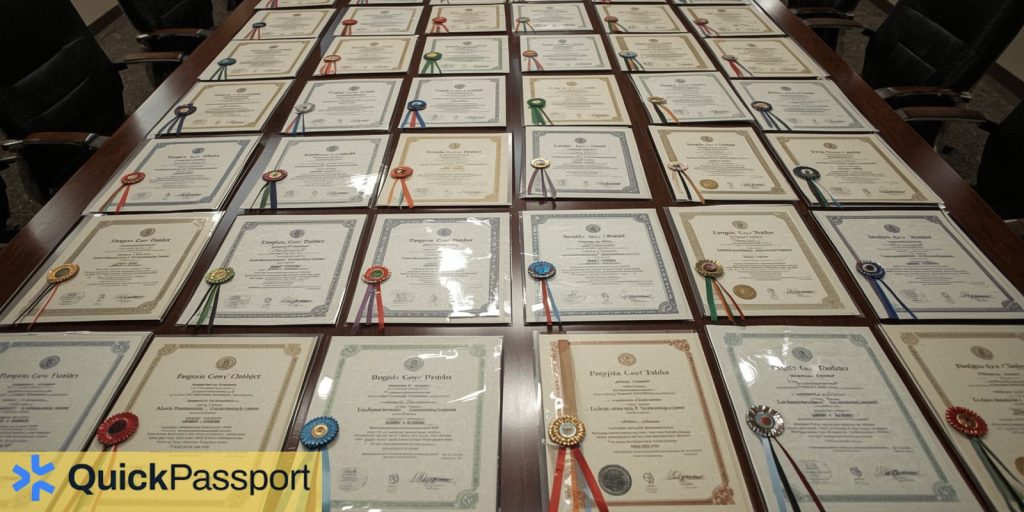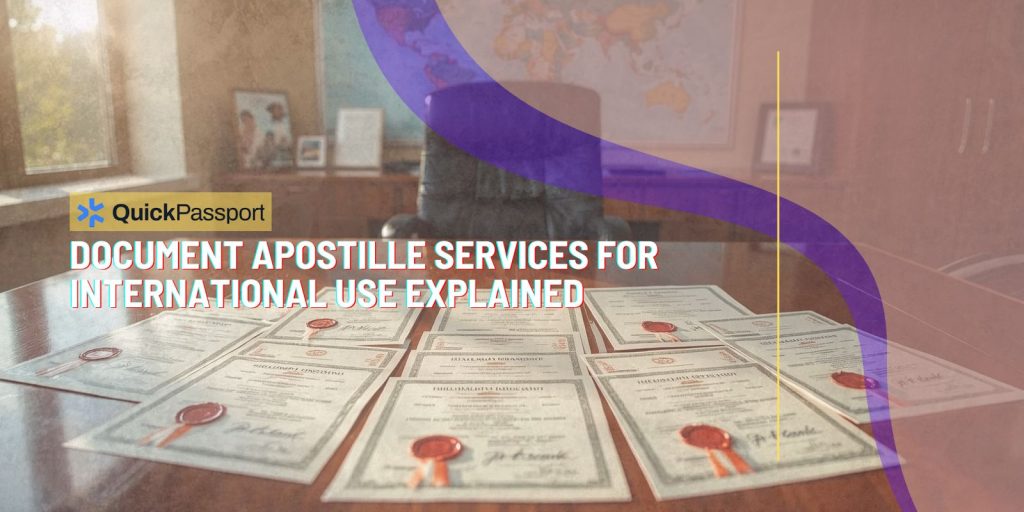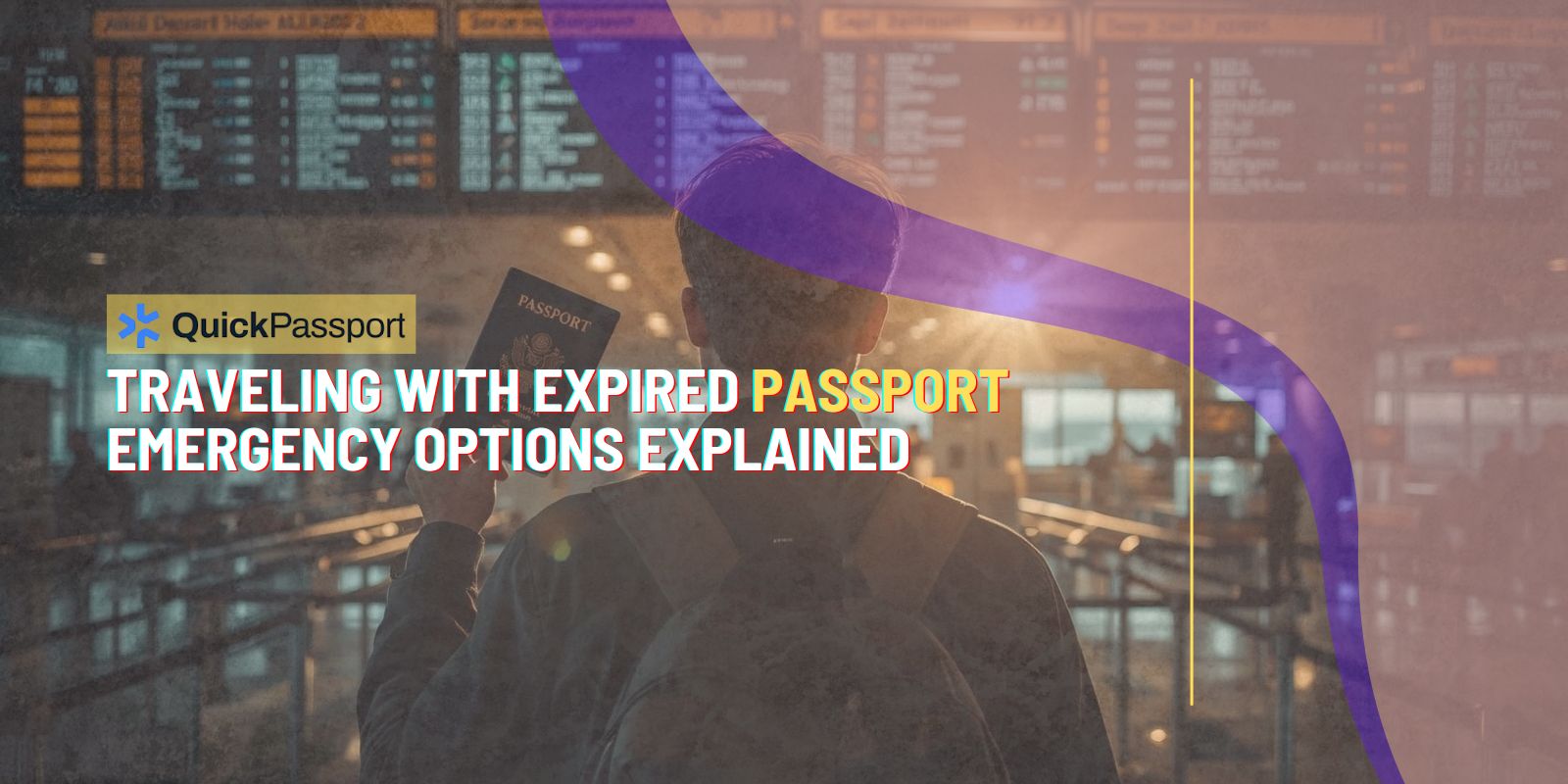When you need to use important documents in a foreign country, simply having the original papers isn’t always enough. International law requires a specific authentication process called apostille to verify that your documents are legitimate and legally recognized across borders. Document apostille services for international use have become increasingly essential as global mobility continues to rise, whether for business expansion, educational pursuits, immigration, or personal matters requiring official documentation abroad.
The apostille process represents a standardized international system established by the Hague Convention of 1961, designed to eliminate the complex and time-consuming chain of authentications previously required for document recognition between member countries. This revolutionary agreement created a unified method for authenticating public documents, making international transactions and legal processes significantly more streamlined and efficient.
Understanding document apostille services is crucial for anyone planning to conduct official business internationally. The process involves obtaining a special certificate that validates the authenticity of your documents’ signatures, seals, and stamps, ensuring they will be accepted by foreign governments, institutions, and organizations. Without proper apostille certification, your vital documents may be rejected, causing delays, additional costs, and potential complications in your international endeavors.
The complexity of apostille requirements varies depending on the type of document, the issuing authority, and the destination country. Personal documents such as birth certificates, marriage licenses, and educational diplomas require different handling than corporate documents like articles of incorporation or power of attorney forms. Professional apostille services navigate these intricacies, ensuring compliance with both domestic and international requirements while minimizing processing time and potential errors.
Modern apostille services have evolved to accommodate the increasing demand for international document authentication, offering expedited processing, comprehensive document preparation, and expert guidance through the entire certification process. These services prove invaluable for individuals and businesses who lack the time, expertise, or resources to navigate the bureaucratic requirements independently, providing peace of mind and guaranteed acceptance of properly authenticated documents.
Key Takeaways
Understanding the essential aspects of document apostille services for international use can save you significant time, money, and frustration when dealing with cross-border documentation requirements. Here are the most important points to remember:
- Apostille certification is mandatory for most official documents used internationally between Hague Convention member countries, making it impossible to skip this crucial step in the authentication process.
- Processing times vary significantly based on document type, issuing state, and current workload, ranging from same-day expedited service to several weeks for standard processing.
- Document preparation is critical for successful apostille certification, requiring original documents or certified copies from the appropriate issuing authority, with specific formatting and condition requirements.
- Professional services offer substantial advantages including expertise in complex requirements, expedited processing options, error prevention, and comprehensive support throughout the authentication process.
- Costs depend on multiple factors including document type, processing speed, state fees, and service provider charges, with expedited options commanding premium pricing.
- Different document categories require specific handling such as educational transcripts needing school registrar certification before apostille, or corporate documents requiring proper notarization and state filing.
- Destination country requirements may vary even among Hague Convention members, with some nations requiring additional steps like consular legalization or translation certification.
- Timing is crucial for international deadlines such as visa applications, business registrations, or educational enrollment, making early planning and professional assistance essential for success.
Understanding the Apostille Process and Requirements
The apostille process represents a sophisticated system of international document authentication that requires careful attention to detail and thorough understanding of legal requirements. At its core, an apostille is a specialized certificate issued by designated government authorities that verifies the authenticity of public documents for use in foreign countries that are members of the Hague Convention.

The foundation of apostille services lies in the 1961 Hague Convention Abolishing the Requirement of Legalization for Foreign Public Documents, which established a uniform method for authenticating documents across participating nations. This international treaty created a standardized certificate format that eliminates the need for multiple levels of authentication, significantly simplifying the process of using documents internationally.
Each participating country designates specific authorities responsible for issuing apostilles, typically at the state or federal level depending on the document type and origin. In the United States, the Secretary of State offices in individual states handle most apostille requests, while federal documents require authentication through the U.S. Department of State in Washington, D.C. Understanding which authority handles your specific document type is crucial for successful authentication.
The apostille certificate itself contains specific information including the country of origin, the name of the person who signed the document, the capacity in which that person acted, the name of the institution or authority that affixed the seal or stamp, the place of certification, the date of certification, and the authority issuing the apostille. This standardized format ensures universal recognition among member countries while maintaining security features that prevent fraud and forgery.
Document eligibility for apostille services depends on several factors, including the document’s origin, the issuing authority, and the intended use abroad. Public documents such as birth certificates, death certificates, marriage licenses, divorce decrees, court orders, notarized documents, educational diplomas, and corporate filings typically qualify for apostille certification. However, privately issued documents or those lacking proper governmental authentication may require additional steps before apostille processing.
Types of Documents Requiring Apostille Services
The scope of documents requiring apostille services for international use encompasses a broad range of personal, educational, legal, and business documentation, each with specific preparation requirements and authentication procedures. Understanding these categories helps ensure proper handling and successful certification for your international needs.
Personal documents form the largest category of apostille requests, including vital records that establish identity, family relationships, and civil status. Birth certificates require apostille certification for international adoption procedures, dual citizenship applications, marriage abroad, and various immigration processes. Marriage certificates need authentication for spousal visa applications, international property purchases, and banking procedures in foreign countries. Death certificates require apostille for estate matters, insurance claims, and inheritance procedures across international borders.
Educational documents represent another significant category, with academic transcripts, diplomas, and degrees requiring apostille certification for international study programs, professional licensing abroad, and employment verification. These documents often require additional preparation steps, including certification by the issuing educational institution and verification by state education departments before apostille processing. Professional certifications and licensing documents also fall into this category, requiring authentication for practice in foreign jurisdictions.
Legal documents encompass a wide range of materials including power of attorney forms, adoption papers, court judgments, criminal background checks, and litigation documents. These papers often involve complex legal implications and require precise handling to ensure compliance with both domestic and foreign legal requirements. Power of attorney documents, in particular, require careful attention to specific formatting and notarization requirements that vary by jurisdiction.
Corporate and business documents require apostille certification for international business operations, including articles of incorporation, certificates of good standing, corporate bylaws, financial statements, and commercial contracts. These documents enable businesses to establish operations abroad, enter into international partnerships, and comply with foreign regulatory requirements. The authentication process for business documents often involves multiple steps, including proper corporate authorization and state-level certification before apostille issuance.
Specialized documents such as FBI background checks, medical records, patent applications, and trademark registrations also require apostille certification for specific international purposes. These documents often involve federal agencies and require unique handling procedures that differ from standard state-level apostille processes. Understanding the specific requirements for each document type ensures proper preparation and successful authentication.
The Step-by-Step Apostille Certification Process
The apostille certification process involves a systematic approach that requires careful attention to detail, proper documentation, and adherence to specific timelines and requirements. Understanding each step helps ensure successful authentication while avoiding common pitfalls that can cause delays or rejections.
Document preparation represents the critical first phase of the apostille process, requiring verification that you possess the correct type of document from the appropriate issuing authority. Original documents or certified copies directly from the issuing agency are typically required, as photocopies or uncertified duplicates will not be accepted for apostille certification. This preparation phase often involves contacting vital records offices, educational institutions, or government agencies to obtain properly certified copies that meet apostille requirements.
The authentication hierarchy must be followed precisely, as documents often require preliminary certification before apostille processing. Notarized documents need verification of the notary’s commission by the appropriate state authority, while educational documents may require registrar certification and state education department verification. Corporate documents often need secretary of state filing verification before apostille issuance, creating a multi-step process that requires careful coordination and timing.
State authority submission involves preparing the proper application forms, fees, and supporting documentation for the designated apostille issuing office. Each state maintains specific procedures, fee structures, and processing timelines that must be followed exactly to avoid delays or rejections. Some states offer online submission systems, while others require mail-in or in-person submission, affecting overall processing time and convenience.
Processing timelines vary significantly based on the issuing authority, current workload, document complexity, and requested service level. Standard processing typically ranges from five to fifteen business days, while expedited services may offer same-day or next-day processing for additional fees. Understanding these timelines is crucial for meeting international deadlines such as visa applications, business registrations, or educational enrollment requirements.
Quality control and verification procedures ensure that completed apostilles meet international standards and contain accurate information. This includes verification of document authenticity, proper signature and seal authentication, and compliance with Hague Convention requirements. Professional apostille services often provide additional quality assurance measures, including document review, error checking, and compliance verification before submission to issuing authorities.
Return and delivery procedures complete the apostille process, with options ranging from standard mail delivery to secure courier services depending on document value and urgency. Many professional services offer tracking capabilities, insurance options, and secure handling procedures that provide peace of mind and protection for valuable authenticated documents.
Benefits of Professional Apostille Services
Professional apostille services provide significant advantages over attempting to navigate the complex authentication process independently, offering expertise, efficiency, and peace of mind that prove invaluable for important international documentation needs. These specialized services have developed streamlined procedures and established relationships with issuing authorities that enable faster processing and higher success rates.

Expertise and knowledge represent the primary advantages of professional apostille services, as experienced providers understand the intricate requirements, common pitfalls, and best practices for successful document authentication. This expertise extends to understanding which documents require preliminary certification, identifying the correct issuing authorities, and ensuring compliance with both domestic and international requirements. Professional services stay current with changing regulations, processing procedures, and international requirements that can affect apostille acceptance abroad.
Time savings and convenience make professional services attractive for busy individuals and businesses who cannot afford delays or complications in their international documentation needs. Professional providers handle all aspects of the apostille process, from document preparation and preliminary certifications to submission, tracking, and delivery. This comprehensive service eliminates the need for multiple trips to government offices, extensive research into requirements, and time-consuming coordination with various authorities.
Error prevention and quality assurance provided by professional services significantly reduce the risk of rejections, delays, and additional costs associated with improper document preparation or submission. Experienced providers review documents for compliance, verify proper formatting and certification, and ensure that all requirements are met before submission to issuing authorities. This attention to detail prevents common mistakes that can result in rejected applications and extended processing times.
Expedited processing options available through professional services can meet urgent deadlines that would be impossible through standard processing channels. Many providers maintain relationships with issuing authorities that enable faster processing, while others offer hand-delivery services and priority handling that can reduce processing time from weeks to days or even hours in emergency situations.
Comprehensive support services often include document retrieval, preliminary certifications, translation coordination, and international delivery options that provide end-to-end solutions for complex apostille requirements. This full-service approach is particularly valuable for individuals dealing with multiple documents, complex authentication chains, or international deadlines that require precise coordination and timing.
Risk mitigation and insurance options provided by professional services protect against loss, damage, or theft of valuable documents during the apostille process. Many providers offer secure handling procedures, tracking capabilities, and insurance coverage that provides financial protection and peace of mind for irreplaceable documents such as original diplomas, birth certificates, or corporate filings.
Choosing the Right Apostille Service Provider
Selecting an appropriate apostille service provider requires careful evaluation of multiple factors including experience, reputation, service offerings, pricing, and customer support capabilities. The right provider can make the difference between a smooth, efficient process and a frustrating experience filled with delays and complications.
Experience and specialization should be primary considerations when evaluating apostille service providers, as the complexity of international document authentication requires deep knowledge of requirements, procedures, and potential complications. Look for providers with extensive experience in your specific document types and destination countries, as requirements can vary significantly based on these factors. Established providers often have developed relationships with issuing authorities and understand the nuances that can affect processing time and success rates.
Reputation and credentials provide important insights into service quality and reliability, with customer reviews, professional associations, and industry recognition serving as valuable indicators of provider performance. Research online reviews, Better Business Bureau ratings, and professional certifications that demonstrate commitment to quality and ethical business practices. Word-of-mouth recommendations from colleagues, attorneys, or other professionals can also provide valuable insights into provider capabilities and service quality.
Service offerings and capabilities should align with your specific needs, including document types handled, processing speed options, geographic coverage, and additional services such as document retrieval or translation coordination. Some providers specialize in specific document categories or destination countries, while others offer comprehensive services covering all apostille requirements. Evaluate whether providers offer the specific services you need and have experience with your particular documentation requirements.
Pricing transparency and value assessment require careful comparison of fee structures, included services, and additional charges that may apply to your specific situation. While cost should not be the only consideration, understanding the total investment required and comparing value propositions helps ensure you receive appropriate service for your budget. Be wary of providers offering significantly below-market pricing, as this may indicate corners being cut in service quality or hidden fees that emerge later in the process.
Customer support and communication capabilities become crucial when dealing with time-sensitive international documentation needs, as questions and issues often arise during the apostille process. Evaluate provider responsiveness, communication methods, and availability during your required timeframe. Look for providers offering multiple communication channels, regular status updates, and knowledgeable staff who can address questions and concerns promptly.
QuickPassport – Arlington exemplifies the professional apostille service approach, offering comprehensive document authentication services with experienced staff who understand the complexities of international documentation requirements. Their expertise in handling various document types and destination country requirements provides clients with confidence and peace of mind throughout the apostille process.
Frequently Asked Questions
How long does the apostille process typically take?
Processing times for apostille services vary significantly based on the issuing state, document type, and service level selected. Standard processing typically ranges from 5-15 business days, while expedited services can reduce this to 1-3 business days for additional fees. Some states offer same-day processing for urgent requests, though this requires in-person submission and premium pricing.
Can I apostille photocopies of my original documents?
No, photocopies cannot be apostilled directly. You must provide either original documents or certified copies issued by the original issuing authority. For example, birth certificate copies must come from the vital records office, while educational document copies must be certified by the school registrar or appropriate educational authority.
What happens if my document is rejected for apostille?
Document rejections typically occur due to improper certification, incorrect document type, or missing preliminary authentication steps. Professional apostille services can help identify the specific issue and guide you through the correction process, which may involve obtaining proper certification or addressing formatting requirements before resubmission.
Do all countries accept apostille certification?
Only countries that are members of the Hague Convention accept apostille certification. Non-member countries require consular legalization through their embassy or consulate, which involves a different and typically more complex authentication process. It’s important to verify whether your destination country accepts apostilles before beginning the process.
How much do apostille services typically cost?
Apostille costs include state fees (typically $10-25 per document) plus service provider fees for professional assistance. Total costs can range from $50-200 per document depending on processing speed, document complexity, and additional services required. Expedited processing and specialized handling command premium pricing.
Can I apostille documents from any state?
Documents must be apostilled by the state where they were originally issued. For example, a California birth certificate must be apostilled by the California Secretary of State, while a New York corporate document requires New York apostille certification. Federal documents require authentication through the U.S. Department of State.
What information is included on an apostille certificate?
Apostille certificates contain standardized information including the country of origin, signatory name and capacity, issuing institution name, certification place and date, and the apostille issuing authority information. This standardized format ensures universal recognition among Hague Convention member countries.
How should I protect my apostilled documents during international travel?
Protect apostilled documents by making certified copies before travel, storing originals and copies separately, using document protection sleeves or folders, and considering secure digital copies as backup. Some travelers also obtain multiple apostilled copies of critical documents to prevent delays if originals are lost or damaged abroad.
Conclusion
Document apostille services for international use represent an essential component of modern global mobility, enabling individuals and businesses to conduct official activities across international borders with confidence and legal compliance. The complexity of apostille requirements, combined with the critical importance of proper authentication for international success, makes professional apostille services invaluable for most people dealing with cross-border documentation needs.
Understanding the apostille process, from initial document preparation through final certification and delivery, empowers you to make informed decisions about handling your international documentation requirements. Whether pursuing educational opportunities abroad, expanding business operations internationally, or managing personal affairs across borders, proper apostille certification ensures your documents will be accepted and recognized by foreign authorities.
The investment in professional apostille services typically pays dividends through time savings, error prevention, and peace of mind that comes from expert handling of critical documentation. As international requirements continue to evolve and global mobility increases, having reliable access to experienced apostille services becomes increasingly valuable for successful international endeavors.
Planning ahead and working with reputable service providers like QuickPassport – Arlington ensures that your international documentation needs are met efficiently and effectively, allowing you to focus on your primary objectives rather than navigating complex bureaucratic requirements. The proper authentication of your documents through apostille services opens doors to international opportunities while providing the legal foundation necessary for success in our interconnected global economy.






